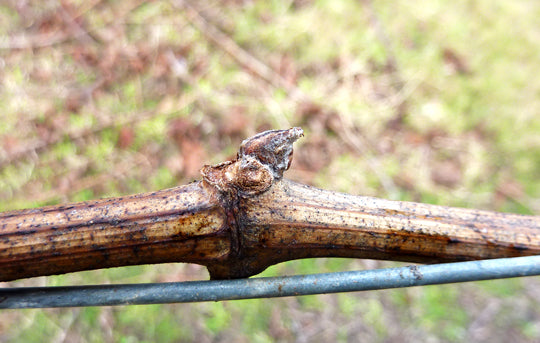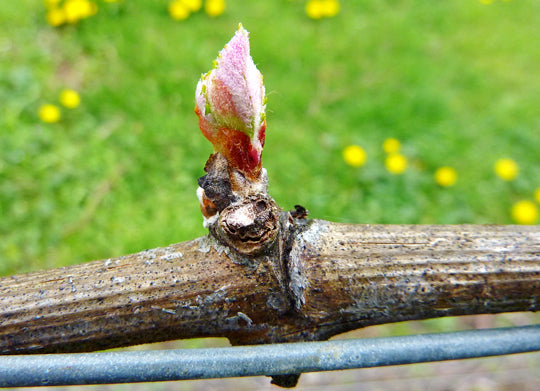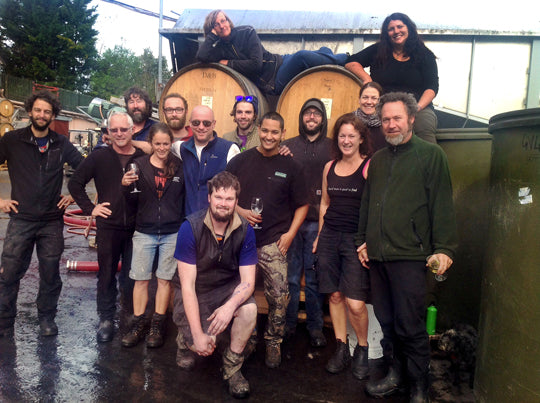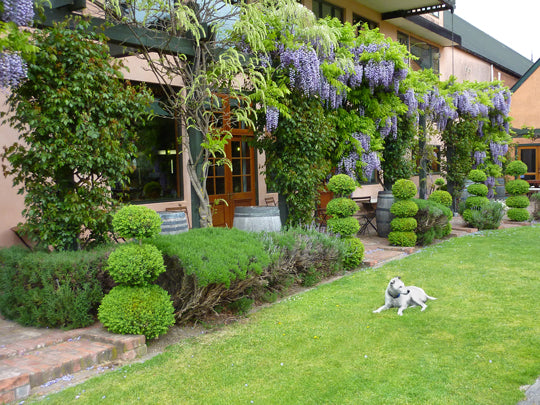Frost – Foe or Friend
Those who grow grapes in a cool climate fear frost and at Pegasus Bay we certainly toss and turn in our cots at night during late spring and early autumn. A spring frost can kill the tender new shoots, leaves and inflorescences (flower buds). The vine recovers but generally speaking that season’s crop is lost and the fruitless plant requires a lot of extra work in order to get it into production the following year. Should Jack do his frosty work before the grapes are ready to harvest in the autumn the sugar content protects the berries themselves but the leaves are lost. As these are the powerhouses of the plant, producing its energy and its carbohydrates, ripening stops and the grapes will never reach optimum condition. The wine they make will be of lower than ideal quality. So why grow grapes in a cool climate when vines grow perfectly well in warm and even hot climates where there is no risk of frost?
The reason is that a cool clime tends draws out the ripening process, which gives the grapes and wine more flavour and better balance. In some hot climate areas a technique of double pruning is used in an attempt to slow ripening so that the first foliage that has grown is purposely removed. In others ripening is so rapid that it is possible to produce two crops a year, giving the vines little chance to rest. Such methods are better suited to the production of industrial alcohol! There is a saying in the wine industry that “frost free vines don’t make good wines” and fortunately there are few totally frost free viticultural regions in New Zealand. Yes, from Central Otago to Auckland frost can be a problem and even Auckland vineyards may resort to helicopters to prevent damage. But grapevines are deciduous plants; what about winter frosts when they have no leaves? Can they be hurt at that stage? The answer is definitely yes, but this tends to be a continental problem where the mercury can tumble to levels that seem staggeringly low when compared with our relatively balmy kiwi winters. The dormant buds that give rise to all of the new season’s growth can be damaged by -10 to -20°C, depending on the variety, and lower temperatures may even kill the vines. In some countries soil is mounded around vine trunks in attempt to protect them from the cold. In 1956 France’s biggest premium winegrowing district, Bordeaux, lost extensive tracts of vines due to frost and in some cases entire vineyards needed to be replanted.
But there are a few things in this life that are all bad and although we may moan about the frost when it nips our fingers and toes during winter pruning it is probably doing good. There is little scientific data to prove the point but it’s probably more than just an urban myth that frosts kill off some of the pesky insects that attack our vines. It may be part of the reason that our long-standing policy of not spraying pesticides has been so successful. Believing this certainly makes us swear less when we do have to get out of our cots to deal with any rogue spring and autumn freezes.


Vintage Birds
The vintage of 2014 has come and gone and as usual the ripe fruits of autumn attracted a host of birds. Most were frustrated and went away without a single grape because we net our entire vineyard. We are keen that the time of harvest is decided by us and not our winged friends. There is, however, a type of vintage bird that we welcome and happily let loose on our grapes. This flies in when the berries are optimally ripe and delicious and wings its way off when they are all gone and their wine is safely in tank and barrel. Flying winemakers come to help us every year. They are young, enthusiastic, talented people who want to expand their horizons and gain extra experience but they give as well as take. They provide us with new ideas and add an international perspective to our wines.
They are ably supported and directed by our own dedicated winery staff and for 6–8 weeks they work together, eat together and live in close contact. But we want them to take away more than just memories of the inside of a winery so that we make sure they have a chance to see wider New Zealand before they flit off.
This year our flock of vintage birds came from Oregon (1), the UK (1), France (2) and from French speaking Canada (2). Naturally, there was more than the odd French word heard around the winery and don’t be surprised if you detect an international flavour in our wines. But unlike our feathered friends these birds did not pick any grapes and if it wasn’t for our equally hard-working vineyard staff we would not have had a vintage. They may be locals but they have equally varied and fascinating backgrounds. To all those involved in the vintage of 2014 Pegasus Bay owes a debt of gratitude and we are sure you will agree when you eventually taste the wines.

From the left : (standing) Mark Rose NZ, Pete Lidgard NZ, Phil Clausen NZ, Marie-Christine Dufour Canada, François Robichon France, Jamie Moss UK, Alexandre Aires France, Surya Venkataiah NZ, Gavin Williams Oregon, Di Blakley NZ, Amy Farnsworth Canada, Matthew Donaldson NZ, (lying) Lydia Schwaiger Germany, (sitting) Janine Rickards NZ, (crouching) Phillip Hughs NZ.
The Hat Fits Us and We Will Wear It!

It is not every day that you are handed a Hat but that has just happened to the Pegasus Bay Restaurant. There is a saying that “If the hat fits you then wear it” and that is exactly what the old nag intends to do. Doubtless we will have to cut a couple of holes for its ears to poke through and we will have to make certain its head does not swell. We want it to remain its unassuming friendly self; the one we all know and love.
It has been with us since we first opened our stable doors 22 years ago and it has stuck with us through thick and thin, always doing its best to please. It was amazed when it was named as The Best Casual Dining Restaurant in New Zealand by Cuisine Magazine in 2005 and then proceeded to take out the accolade of being the Top Vineyard Restaurant in the country in five subsequent years. Cuisine Magazine has now introduced a system of Chefs’ Hats, which, like the Australian Good Food Guide, is modelled on the Michelin system of stars. Cuisine awards top restaurants 1- 3 Hats. This year it has awarded a Hat to 3 vineyard restaurants in the country, the other two being Elephant Hill in Hawke’s Bay and Amisfield in Central Otago. Two other of Canterbury’s almost 2000 eateries, Pescator and Roots, also featured and each received a Hat. This comes hot on the heels of Pegasus Bay Restaurant being named as the Best Regional Establishment in the 2014 Christchurch Hospitality Awards. While Hats may not be quite as rare as rocking horse teeth there is only a tiny proportion of restaurants in New Zealand to be awarded them so that we feel really honoured to receive this recognition. We take our hats off to head chef Teresa Pert, maitre d’ Bora Hong, restaurant manager Belinda Donaldson and all of our kitchen and front of house staff. They look forward to welcoming you and serving you our best.
Remember, it’s always safest to ring 03 314 6869, extension 1, to make a restaurant reservation but feel free to pop in and taste our range of wines at any time as our tasting room is open every day between 10am and 5pm.

Waste Not Water
The use of fresh water in irrigation is a hot topic in New Zealand these days and rightly so. It is a highly prized resource and not one to be squandered. Irrigation is used in vineyards all over the world, even in countries where irrigation in viticulture is said to be banned. Watering young plants is permitted almost everywhere. In Europe it generally ceases after three years but when the mercury soars strange things can happen in out of the way places. When queried about a large sprinkler that was throwing water far and wide amongst gnarly old vines in the Rhône Valley on a stinkingly hot day in July the owner replied that he was allowed to water young vines and that he had recently been forced to replant some of the ancients that had eventually died. The French have their own special way of doing things and although irrigating established grapevines is interdit this prohibition was mysteriously lifted during the heat wave of 2003.
The New World, including New Zealand, has been more relaxed about allowing supplementary watering of grape vines if it is necessary and it has been considered more important to keep plants and their fruit healthy rather than just have a one size fits all blanket rule.At Pegasus Bay we do irrigate but we use a system of “deficit irrigation” throughout most of the growing season. This means that we only use supplementary watering if it is really necessary and we allow our vines to become quite dry before doing this. Liberal application of water causes excessive vigour. The plants grow excessively, resulting in shading of the fruit, bloated berries and bigger crops; just the sort of thing that we are trying to avoid. In addition, deficit irrigation means that the water you apply does not merely percolate through the soil or run off. But this type of viticulture leaves you on a knife edge because if you allow the vines to become too dry they sulk, turn off their metabolism, start losing their leaves and then their fruit. To do this safely we have to measure the soil moisture at different depths and in different blocks. Water requirement depends not only on rainfall but on different soil and grapevine types. This has meant that we have had to take a lot of separate measurements by hand, a time-consuming and labour intensive business.
At Pegasus Bay we have now installed electronic sensors that allow us to instantly assess the real time soil moisture content throughout our vineyard. This can be done from any computer or smart phone and has allowed us to fine tune any watering. Water is precious and we have no intention of wasting even a drop so that each vine has its own individual dripper and we apply it only in the required amount when it is really needed. In the end it is all about trying to be ecologically responsible and sustainable.
From the Prescription Pad
The world seems to be all about marketing these days and if you want to sell something then you ignore marketing at your peril. Everything from selling lettuces to selling Airbuses, including yourself, needs marketing. The methods you utilise might vary widely depending on your needs, means, experience and expectations. You might sell your lettuce in a market with nothing more than the price scrawled on a piece of cardboard, spend megabucks advertising your new aircraft or promote yourself by electronic media. Even immensely popular sites like Face book can be seen as a type of self-marketing exercise and some regard it as a status symbol to have more “friends” than their pals.There are those to whom marketing is a science. They populate university departments, conduct experiments, and publish articles. Then there are those who market their marketing expertise. Their businesses will advise you on marketing strategies, positioning, logos, websites and the like. And then there are those who actually do the marketing. They need to have a nose for the ebbs and flows of the marketplace, seek out opportunities, be attune to the needs and wants of customers, and have the ability to develop an easy rapport with people. You can easily get lost in the marketing labyrinth and find your wallet severely lightened if you do not know what you want.
When the flying horse tentatively poked its nose out of the stable door for the first time in 1992 all it wanted to do was to sell a few bottles of wine. It certainly had nothing as grandiose as a marketing philosophy. It simply decided to stick to its home turf for the first few years until it got the feel of the place and since then things have just grown organically. We started by selling the odd bottle through our restaurant and from the cellar door. Within a year or two we started a newsletter and began to pick up our most valuable resource; you and like-minded wine enthusiasts and aficionados. Eventually, after a lot of hard work and shoe leather, the old nag got listed in a few places in Christchurch. Then, one day, a lady came to the cellar door, tried the wines, enthused about them and asked us if we would allow her company to distribute our wine throughout the rest of New Zealand. That is how we started with Eurowine and its successor Eurovintage and this set the pattern of things to come. Generally, wine importers and distributors from other countries have come to our winery and asked us if they can be our agents. We first exported to Australia, which seemed like a natural extension of the home market, and then gradually extended to other lands. In other words, we gradually spread from the centre, our base, outwards as our limited supply of wine allowed. This was our simpleminded plan as we have always valued our home market. You can now buy Pegasus Bay wine in about 30 different countries. That seems like quite a lot, doesn’t it? What are those markets and why do we sell in so many when we are just a relatively small vineyard?
As you might expect, you can readily find our wines in English speaking countries, such as Australia, Canada, USA and Britain and in those where English is common, including Belgium, Holland, Denmark, Sweden and Norway. But wine has its own language and transcends the confines of a single tongue. Our wine has even talked its way into traditional wine producing areas of Europe, such as Germany, France, Italy, Spain and Portugal. And then there are the emerging markets of Asia where the flying horse can be found in Japan, mainland China, Hong Kong, Taiwan, Singapore, Malaysia, Korea and the like. Finally, we export wine to a number of seemingly exotic markets; for example Mauritius, Seychelles, Maldives, Andorra, Abu Dhabi, Barbados, Panama, Turk and Caicos Islands, Brazil and Laos. I do not wish to imply that these last mentioned locations are themselves in any way strange but it may seem unusual that the product of a cheeky little Kiwi vineyard would turn up there. Would Pegasus be better not to spread its wings so far and to sell all its wine in the major traditional wine markets? It would make servicing these easier and be just as financially rewarding. Why bother with all these exotic or seemingly out of the way places where sales could never be expected to be large? The reason is that in all of these locations, as in the traditional wine markets, our importers are people with a passion for wine and food that have sought us out. Their businesses are often family owned and operated. Most are connected with upmarket hotels and restaurants that cater for international tourists who expect to be able to pamper themselves no matter how isolated or secluded the retreat. While such guests have frequently chosen out of the way places to avoid the madding crowd, there is a degree of rusticity to which they do not wish to sink. They expect creature comforts and one such essential is a decent bottle of wine with their exquisitely cooked local cuisine. Being well heeled doesn’t prevent such good folk from sharing their happy experiences with their friends and colleagues and in such circles word-of-mouth is undoubtedly the best form of marketing. In addition, some of these guests are already our good customers and we feel that they will appreciate having our wine available for them to enjoy in such places. “Well”, you might ask, “if you’re going to send wine to all these markets won’t you have to increase your production?”
It’s a curious thing that the economic mechanism on which the world runs is based on growth. If a country’s economy is static it is said to be in recession. Financial well-being is seen as being based on having continually expanding economic growth and this applies to businesses as well as countries. It has led to bigger and bigger businesses but fewer and fewer players in the market as corporates gobble up or squeeze their opposition. I think an economic model that is based on such continual expansion is flawed. The Kiwi wine business, however, has not been exempt from this phenomenon. As a small player, we have decided we do not wish to follow this trend. We have seen many wineries lose their quality focus with increased production and are firmly of the opinion that bigger is not better. We believe that our focus should be on the quality of our wines and “Better, not bigger” should be our motto.
Cheers

Recent Seasons
The weather of the 2006 vintage was very even throughout the growing season, resulting in balanced wines from good, but not excessive, crops. Blustery winds in spring impaired pollination and lead to a small 2007 harvest, but it gave richness and flavour to the well ripened fruit. Drought conditions were staved off by a mid-summer downpour in 2008, but beautiful weather followed. Late autumn rain produced noble botrytis in late harvest fruit. The growing conditions of the 2009 vintage were amongst our best and we are delighted with both the reds and whites. The 2010 season was marked by a cloudy and indifferent late spring and early summer.
In February, however, the sun began to shine and we had 3 months of perfect, warm, dry weather, allowing us to achieve excellent ripeness and levels of natural acidity. The 2011 vintage followed a very warm season and was one of the earliest we have experienced, producing beautiful physiological ripeness. It was a complete contrast to the following season and 2012 was one of the slowest ripening vintages that we have experienced. Dry weather in late autumn allowed a prolonged hang time, which has produced a splendid spectrum of flavours.
